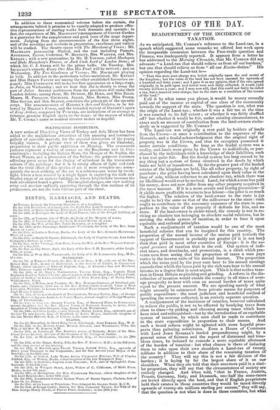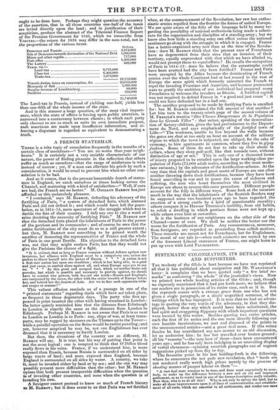TOPICS OF THE DAY.
READJUSTMENT OF THE INCIDENCE OF TAXATION.
As we anticipated, Mr. COBDEN'S reference to the Land-tax, in a speech which suggested some remarks we offered last week upon the inseparable connexion between the Free-trade question and Finance, was inadequately reported. It appears from a letter he has addressed to the Morning Chronicle, that Mr. COBDEN did not advocate " a Land-tax that should relieve us from all our burdens," but one that should relieve us from " all our Excise-duties." His opinion regarding the Land-tax is- " That this state rent-charge was levied originally upon the real rental of the kingdom ; but the value of the land has not been assessed for upwards of a hundred and forty years; and I gave it as my opinion, that if the rate agreed originally to be paid upon real rental were now fairly collected, it would yield twenty millions a year ; and I may now add, that this could not fairly be called a tax, but a renewed rent-charge, due to the state as a condition of the tenure of the land."
Call it by what name you please, it would be money annually paid out of the income or capital of one class of the community towards the support of the state. The question is not, what was the origin of the Land-tax ; whether it was a fair tax at the time it was exacted to its full extent ; or whether it was fairly shuffled off? but whether it would be fair, under existing circumstances, to exact such an amount of contribution from the land-owners exclu- sively as is suggested by Mr. COBDEN ? The Land-tax was originally a rent paid by holders of lands from the Crown—at once a contribution to the expenses of the Monarch, and a feudal acknowledgment that the original right of property was in the Crown, and that its occupiers possessed it under certain conditions. So long as the feudal system was a reality, and lands were given by the Crown to individuals, or pur- chased by the individuals with a knowledge of their liabilities, such a tax was quite fair. But the feudal system has long ceased to be any thing but a system of forms observed in the deeds by which lands are held or transferred. By far the greater part of the landed estates of the kingdom are held, like all other property, by right of purchase ; the price having been calculated upon their value at the time of sale, without reference to an obsolete tax, which there was no likelihood would ever be revived. Land, for which a man has paid his money, does not now differ from any other property acquired in the same manner. If it is a more secure and lasting possession—if it yields more profitable returns to less labour—the price is so much the higher. The relation of the land-owner to the state is (or ought to be) the same as that of the mill-owner to the state : each ought to contribute to the necessary expenses of the state in pro- portion to the value of the property it defends for him, and no more. If the land-owner is under-taxed, the remedy is not in re- viving an obsolete tax belonging to obsolete social relations, but in revising the whole system of taxation, in order to base it upon equitable and rational principles. Such a readjustment of taxation would be one of the most beneficial reforms that can be imagined for this country. The proportion of the annual income of the nation paid towards the support of Government is probably not greater (if it is not less) than that paid in most other countries of Europe : it is the un- equal pressure of taxation that is the evil. Our system of indi- rect taxes, and drawbacks, and protections, is a Cloak which pre- vents men from seeing that the proportion of taxes a man pays varies in the inverse ratio of his annual income. The proportion which the taxes paid by the poor man bear to his annual earnings exceeds that which the taxes paid by the rich man bear to his annual income, to a degree that is most unjust. This it is that makes taxa- tion in Great Britain so pinching and grinding. A reform in the dis- tribution of taxation would enable the country in all times of aver- age prosperity to bear with ease an annual burden of taxes quite equal to the present amount. We are speaking merely of what might annually be subtracted from private means for purposes of' public expenditure : the most judicious and beneficial method of spending the revenue collected, is an entirely separate question. A readjustment of the incidence of taxation, however calculated to relieve the public, is not to be effected by bandying taxes from class to class—by picking and choosing among taxes which have been tried and relinquished—but by the introduction of an equitable system of taxation, by which men shall be made to contribute to the state expenditure in proportion to their means. And such a broad reform might be agitated with more hopeful pros- pects than paltering substitutes. Even a House of Commons; with Lord JOHN Russzu:s landed preponderancy might, by a general sense of fairness and the aspect of distressed and trou- blous times, be induced to concede a more equitable allotment of the burden of taxation : but what chance is there of inducing them to take upon their own shoulders a Land-tax of twenty millions in addition to their share of the remaining taxation of the country ? They will say this is not a fair division of the burden ; it is laying by far the largest share of it on our shoulders. When they are told that their ancestors paid in a simi- lar proportion, they will say that the circumstances of society are entirely changed. And when told, "that in France, Austria, Prussia, Germany, Italy, and Denmark, one-half the state-taxes are levied directly upon the land, and that if English proprietors held their estates in those countries they would be taxed directly upwards of twenty-six millions sterling per annum," they will say, that the question is not what is done m those countries, but what
ought to be done here. Perhaps they might question the accuracy of the assertion, that in all those countries one-half of the taxes are levied directly upon the land ; and in justification of their scepticism, produce the abstract of the Triennial Finance Report of the Prussian Government for 1835, which we transcribe from VOIGTEL—the return for 1838 may differ in the sum-total, not in the proportions of the various items.
Demesnes and Forests Sale of Demesnes towards diminution of the National Debt Mines and other regalia Post-office The Lottery Taxes, viz.- Land-tax 9,735,000
Class-tax 6,404,000
Trade-tax... 1,973,000
18,112,000
Transit-duties, taxes on consumption, &c. 20,052,000 Monopoly of Salt
5,366.000 Surplus revenue of Leuchtenberg
80,000 Sundries
332,000 Total
51,740,000 The Land-tax in Prussia, instead of yielding one-half, yields less than one-fifth of the whole income of the state.
And in this manner a large question, of the most vital import- ance, which the state of affairs is forcing upon public attention, is narrowed into a controversy between classes ; in which each party only chooses to see as much as suits its own immediate purpose, rash assertions are made upon insufficient information, and si- lencing a disputant is regarded as equivalent to demonstrating a truth. Dollars. 4,212.000 1,000,000 717,000 1,20%000 669,000























 Previous page
Previous page